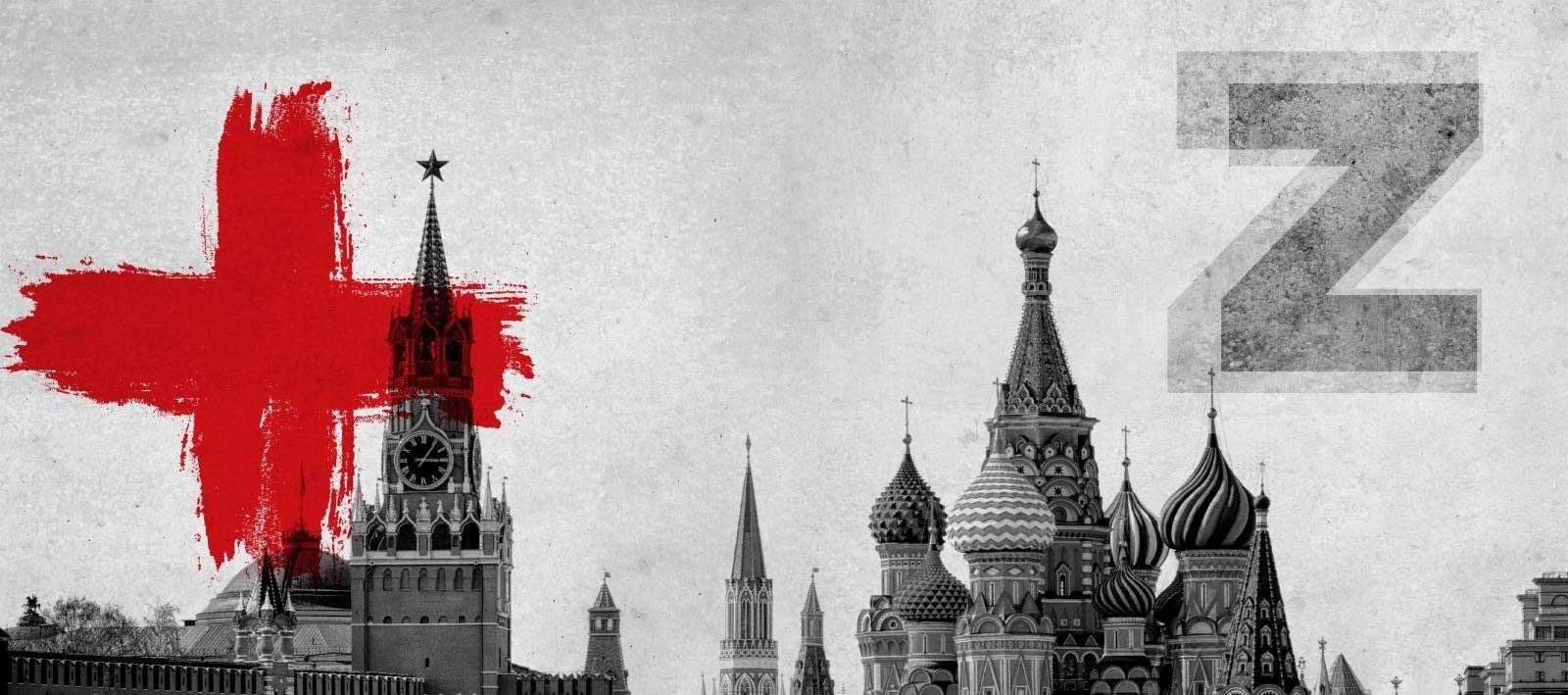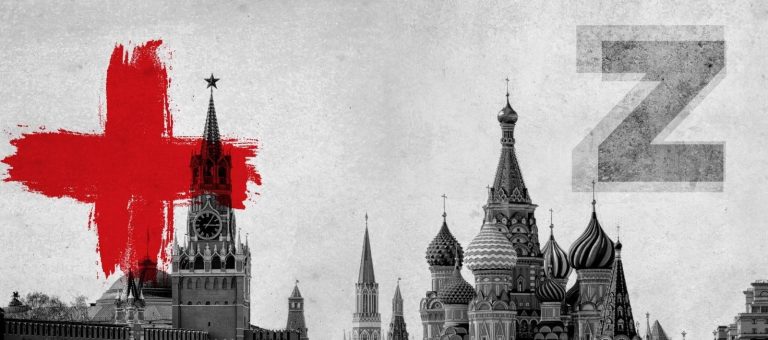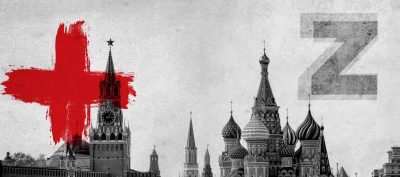Anastasiia Morozova (Vsquare),
Elizaveta Antonova, Svetlana Reiter (Meduza),
Mattias Carlsson (Expressen),
Timo Schober, Jonas Halbe, Frederik Obermaier, Carina Huppertz (Paper Trail Media) 2024-02-27
Anastasiia Morozova (Vsquare),
Elizaveta Antonova, Svetlana Reiter (Meduza),
Mattias Carlsson (Expressen),
Timo Schober, Jonas Halbe, Frederik Obermaier, Carina Huppertz (Paper Trail Media) 2024-02-27
“Kremlin Leaks” reveals how the Putin administration made the Red Cross, which is supposed to remain neutral and independent, part of Russia’s propaganda machine. At the same time, the Kremlin plots to expand the influence of the Russian Red Cross throughout the world, hiding behind the International Red Cross.
One of the Kremlin’s confidential budget documents that we obtained includes a line about financing the Russian chapter of the Red Cross with state funds, followed by the sentence: “On the decision of Sergei Kiriyenko to include [funding] in the outline of the guidelines for the new territories.”
As outlined in the plan, the Kremlin intends to allocate millions of euros to the Russian Red Cross (RRC) to facilitate the establishment of four new regional and 62 local branches across Donbas and the areas the Kremlin refers to as “liberated territories.” This funding will also support the training of coordinators and volunteers, with the objective, among others, “to replace the humanitarian activities of the International Committee of the Red Cross in Donbas.”
In the end, the Russian Red Cross was allocated €6.7 million from Russia’s 2024 state budget.
Experts contacted by us have highlighted that if the plan were carried out, it would violate the International Red Cross Movement’s core principles, according to which any national Red Cross branch is only allowed to operate in another country with that country’s permission. Ukraine’s Red Cross confirmed to us that they haven’t given such permission. Additionally, only the International Committee of the Red Cross (ICRC) is allowed to operate within conflict zones.
“Kremlin Leaks” is a series of articles based on documents leaked from the Russian presidential administration’s so-called domestic political bloc, led by Sergey Kiriyenko. In the series’ opening installment yesterday, we detailed the Kremlin’s efforts to secure Vladimir Putin’s victory in the upcoming presidential election through extensive propaganda funding and its engagement in an information war against its own citizens.
The leaked files, the most recent of which date back to December 2023, were obtained by Estonia’s Delfi. These documents were shared for joint investigation with VSquare and Frontstory.pl (Poland), Expressen (Sweden), Meduza and iStories (independent Russian outlets), Paper Trail Media, Der Spiegel and ZDF (Germany), Der Standard (Austria), and Tamedia publications (Switzerland).
The pivotal connection between the Kremlin and the Russian Red Cross (RRC) is the 29-year-old Pavel Savchuk, who became the head of the RRC in 2021, our investigation revealed. Savchuk’s career notably advanced in 2018 when, at merely 24 years old, he was appointed as a member of the central staff of the “All-Russia People’s Front” (Russian: Общероссийский народный фронт, or ONF). Archival images from that period capture Savchuk at a round table with Vladimir Putin and Sergey Kiriyenko.
Putin’s man in the Red Cross
ONF holds the registered trademark for the notorious “Z”, which emerged as a symbol for Putin’s military campaign following Russia’s full-scale invasion of Ukraine on February 24, 2022. It was also the ONF that, in December 2023, launched the “Putin’s Team” initiative, orchestrating the collection of the necessary signatures for Putin to formally register as a candidate in the upcoming presidential elections.

“We and you are the nation of winners. It is in our genes,” stands in the header of the ONF’s VK page. Pavel Savchuk is a member of the ONF’s general staff. Photo source: Facebook
A year ago, the European Union sanctioned the ONF for several reasons, one being its involvement in the organization of the “All for Victory!” fundraising campaign. This campaign gathers both material and financial contributions to aid the military forces of the so-called Donetsk and Luhansk People’s Republics and the Russian army. This includes purchasing equipment such as night vision goggles, thermal and laser sights, and bulletproof vests for units engaged in the war against Ukraine. Additionally, the ONF, in collaboration with one of Russia’s leading propagandists, Vladimir Solovyov (paid with millions of euros from the state, as we revealed in the first part of the investigation), is also actively fundraising to buy drones for reconnaissance units.
The intricate web of Kremlin-supported initiatives expands further with the introduction of another “citizen’s movement” founded by Putin, known as the “Russian Association of Knowledge” (Российское общество Знание), which also benefits from state financial support worth of millions of euros. This is evidenced by both the documents we have obtained and the public budget of the Russian Federation. The organization’s chairman is Sergey Kiriyenko, with Pavel Savchuk serving as one of its lecturers, aiming to foster patriotism among the youth. In online videos, Savchuk is seen engaging in extensive discussions, using a microphone adorned with the organization’s “Z” symbol, while a large “Z” emblem also decorates the wall behind him.
Savchuk and the RRC did not respond to our inquiries seeking clarification on the appropriateness of the RRC head’s simultaneous involvement with organizations such as the ONF and the Russian Association of Knowledge. They also did not answer any of our other questions, stating that some of our investigative partners (Meduza and iStories), are banned in Russia, and therefore the RRC cannot respond to us.
Meanwhile, Savchuk has shown a completely different face within the international Red Cross community. In the summer of 2022, he was elected to the governing board of the International Federation of the Red Cross and Red Crescent Societies (IFRC). This position allows him to travel to Geneva, where the IFRC’s headquarters are situated. He shares photos from these trips on his Telegram channel. For instance, last December, following the election of the American Kate Forbes as the new president of the IFRC, Savchuk even shared a selfie with her.
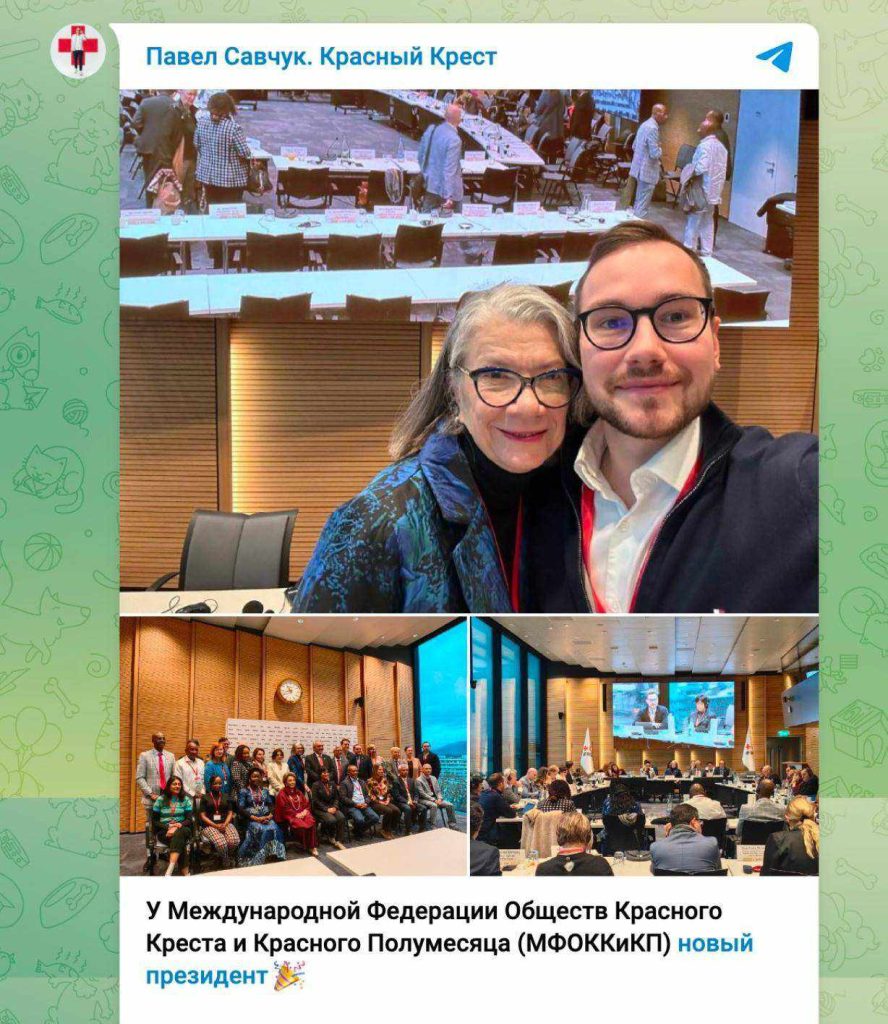
Savchuk’s selfie with Kate Forbes the president of IFRC. Source: Savchuk’s Telegram account
In a written statement, the IFRC and ICRC acknowledged being aware of Savchuk’s role in the general staff of the ONF. According to the IFRC, Savchuk “confirmed his affiliation with ONF from 2019 to March 2022“.
Contradicting this claim, Savchuk was presented on the ONF’s website as a member of its general staff until mid-February this year. It was only after VSquare and our partners submitted press inquiries to the RRC and the IFRC that his name was removed from the list. Additionally, Savchuk’s public resume still indicates his position with the ONF as current.
The documents we obtained also reveal that the Kremlin views Savchuk’s international role as a means to expand Russia’s influence and the prominence of the Russian language. These documents highlight the intention to boost the linguistic center within the Russian Red Cross to translate IFRC materials into Russian and disseminate them, aiming to bolster the status of the Russian language in CIS countries. Another objective is to have Russian recognized as an official working language of the IFRC.
Arming and sending soldiers back to the frontlines
The All-Russia National Front is not the only group with which Savchuk is actively involved that justifies and supports the Kremlin’s war. The documents we obtained also directly link the Russian Red Cross with the “We Are Together” movement (in Russian, it is often referred to with the hashtag #МыВместе). For example, according to the documents, the RRC operates as part of the “We Are Together” staff in providing humanitarian aid in the occupied territories.
Since the Russian invasion of Ukraine, the main purpose of this movement has been to support the families of Russian soldiers. The association and its local branches organize fundraising campaigns, often contradicting the Red Cross’s principles by openly supporting military efforts. They do it completely in public, for example, by promoting on social media an initiative to send thermal sights, camouflage nets, and other equipment to Russian soldiers on the frontline. “We hope this will help our heroes get closer to victory,” they write, adding that “supporting the defenders of the Fatherland and their families” is at the heart of the movement’s activities (this is also highlighted in the 2023 annual report of “We Are Together”).
The website of the “We Are Together” lists RRC among the movement’s official supporters. Other supporters include, for example, the “Defenders of the Fatherland” initiative (an organization under EU sanctions), as well as Russia’s ruling United Russia party and its “Young Guard” youth movement.
Ariane Bauer, the representative of the International Committee of the Red Cross (ICRC) said that RRC’s involvement in the “We Are Together” movement was incompatible with the fundamental principles of the Red Cross movement. Bauer added that the ICRC also drew the Russian chapter’s attention to the problem and that ICRC has drawn attention to the fact that membership of this organization is inadequate.
The “We Are Together” movement annually presents an award with the same name. The award’s organizing committee is headed by the first deputy head of the presidential administration, Sergei Kiriyenko, the man from whose office the leaked budget documents originate. Pavel Savchuk is featured on the movement’s website as a member of the award’s organizing committee, alongside Maria Lvova-Belova, the so-called Commissioner for Children’s Rights in Putin’s office. She has been declared a wanted person by the International Criminal Court and sanctioned by the EU for the deportation of Ukrainian children to Russia. (In our previous article, we also revealed that, based on the leaked documents, Lvova-Belova is set to receive funds worth more than four hundred thousand euros for the “removal” of children from the occupied territories.)
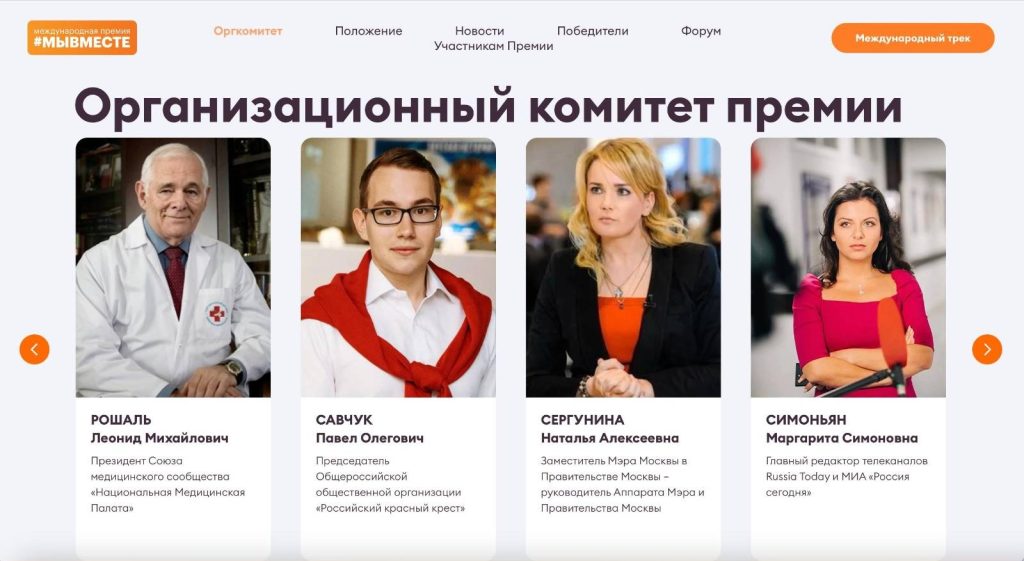
In good company! All other members of the organizing committee in this picture except Savchuk are under EU sanctions. Leonid Roshal is the ONF’s co-Head of Central Staff, Natalia Sergunina is the deputy mayor of Moscow, while Margarita Simonyan is the editor-in-chief of Rossiya Segodnya. Photo source: мывместе.рф official web page
Moreover, Savchuk is also a member of the Civic Chamber of the Russian Federation. This is yet another social organization created on Putin’s orders, which coordinates several projects that endorse and promote the so-called special military operation. Among its ventures, the Civic Chamber plans to form an international public tribunal to probe “Ukrainian neo-Nazis and their accomplices in crimes.” Another project focuses on documenting “Evidence of fascist crimes in Ukraine.”
In the middle of February 2024, Savchuk signed a cooperation agreement between the Russian Red Cross and the “Defenders of the Fatherland”, which has also been created by Putin. The agreement outlines the delivery of psycho-social assistance to war veterans and their families. Anna Tsivileva, leading the “Defenders of the Fatherland,” was the signatory representing the organization.
Tsivileva also happens to be Vladimir Putin’s cousin. The organization, along with Tsivileva herself, was sanctioned by the EU in December 2023 due to its objective of sending veterans back to the frontline. The EU sanctions decree highlighted that Tsivileva’s appointment as head of “Defenders of the Fatherland” was directly linked to her relationship with Putin.
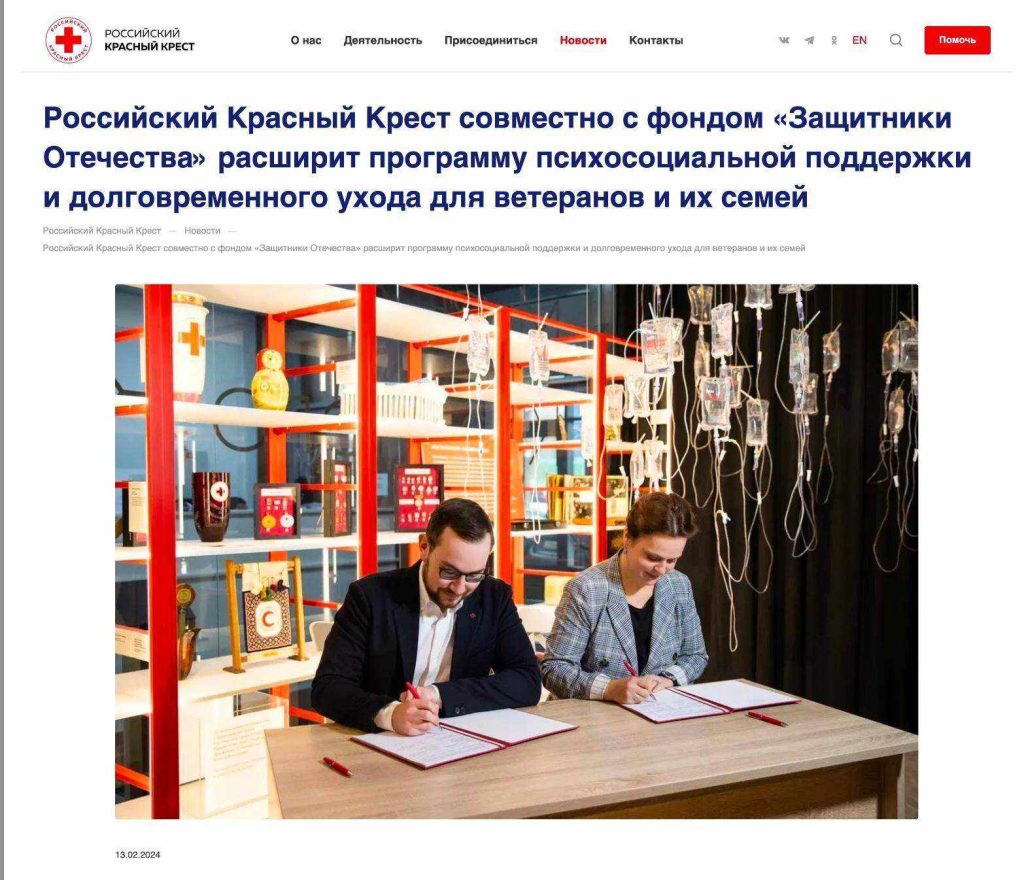
Savchuk signing the cooperation agreement with Putin’s cousin and the leader of the Defenders of the Fatherland. Photo source: Russian Red Cross web page
Awarding weapons manufacturers whose arms kill civilians
On December 14, 2022, Russia continued its attacks on Kyiv and other parts of Ukraine, particularly targeting the power grid with missiles and drones, challenging Ukraine’s air defense capabilities.
Amidst frequent blackouts, Ukrainians adapted to a life without electricity, often seeking shelter during air raids. That evening, spent by many Ukrainians in bomb shelters, Pavel Savchuk awarded the Avangard factory’s management with a diploma on behalf of the RRC, recognizing their contribution to increasing blood donations among factory workers.
At the RRC gala event held in Moscow, the Russian Red Cross was praised as the nation’s oldest humanitarian organization. The event would have been ordinary had Avangard not been an arms factory under the ownership of the sanctioned, state-owned Almaz-Antey Group.
Avangard is the only Russian factory that produces S-300 and S-400 missiles, originally designed as anti-aircraft weapons but also employed against ground targets in Ukraine. According to Indrek Kannik, the head of the International Centre for Defense Studies (ICDS) in Tallinn, these missiles are extremely inaccurate against land targets. “Almost without an exception, Russia hits civilian targets such as apartment buildings, killing dozens and hundreds of Ukrainians. Unfortunately, the Ukrainian air defense struggles to counter them effectively,” Kannik said.
Another company that won the special award at the gala was the United Aircraft Corporation which produces both Su and MiG fighter jets.
Several RRC key officials have made public statements in support of the “special military operation.” Nikolay Dobylev, the head of RRC’s Tver branch, called everyone to support Russian soldiers and officers fighting against Ukraine. “They honorably fulfill their military duty, protecting the security of our country,” Dobylev claimed in local media while also sharing the unsubstantiated claim about the Ukrainian army shooting in the back those Mariupol residents who wanted to flee from the war zone. “How can we talk about some kind of peace negotiations when Ukrainian Nazis are committing war crimes before our eyes?” he is quoted saying in the article.
Irina Levina, who heads the RRC’s Sverdlovsk branch and manages the Sverdlovsk Medical College as its director, wrote in her public new year’s greeting that she wishes to thank colleagues and graduates “who heroically fulfill their military and professional duties in the special military operation.“
“Let us wish them courage, perseverance and God’s help! Victory, victory, victory on all fronts,” she wrote.
The International Committee of the Red Cross (ICRC) and the International Federation of the Red Cross (IFRC) – two of the movement’s central organizations – carefully refrained from taking a position when we asked them to assess both Savchuk’s and the RRC’s specific links to Putin’s regime and propaganda system.
“Russian Red Cross has shown commitment to supporting people who need it most and our Fundamental Principles that guide our work. In case of evidence of breach of integrity, IFRC has its own compliance and investigation mechanisms that apply to any National Society in the network, as per IFRC’s Constitution,” the IFRC said in a statement.
In February 2023, Ukraine imposed sanctions against the RRC and Pavel Savchuk, stating that both were distributing the Kremlin’s propaganda narratives in order to justify Russia’s actions. No other country so far has followed suit.
ICRC already collaborates with occupier Red Cross organizations
According to the documents we obtained, the Kremlin envisaged the RRC to replace the International Red Cross’ operations in the occupied territories of Ukraine. In August 2023, the Donetsk Red Cross branch was registered in the Russian state business registry. It is chaired by a Russian citizen who had been presented as an employee of the RRC in Russian state media just a month earlier.
In June 2023, Russian news agency TASS reported that the RRC had delivered the first humanitarian aid shipment to the so-called Donetsk People’s Republic. A few hours later, TASS changed the phrasing: the aid delivery was no longer organized by the RRC but by the “Donetsk Red Cross.”
At the same time, TASS also published a video in which Ekaterina Suhachova, introduced as a representative of the Donetsk Red Cross, rejoiced that the first humanitarian aid shipment from the RRC arrived. The video’s title read: “The Donetsk Red Cross organization replaces the runaway Committee!” The title is suggesting that the ICRC are fleeing the region instead of fulfilling their job.
However, according to the statutes of the Red Cross movement, only the ICRC is allowed to operate in a military conflict zone. This has been true throughout the history of the movement. One of the most important tasks of the ICRC is to visit prisoners of war, to document the conditions in which they are kept, and to ensure that they are treated in a humane way.
The Red Cross chapter of an occupying state – in this case, Russia – would only be allowed to be present in the occupied territories if authorized by the Ukrainian Red Cross. Of course, the Ukrainian chapter has not given such permission.
Our investigative partner Meduza talked with a source who previously worked for the ICRC. The source confirmed that, during the first two months of the full-scale invasion, the RRC complied with the movement’s principles and did not attempt to enter the occupied territories. However, in 2023, this changed and the RRC started to appear there too. Another source added that RRC volunteers went to Mariupol with a so-called humanitarian mission “no later than the summer of 2023.”
If the RRC would operate in the occupied areas, it would not be compatible with the movement’s charter, according to Ariane Bauer, the director of the ICRC’s regional operations directorate for Europe and Central Asia
“There are no employees of the Russian Red Cross in the occupied territories,” Bauer said. The Donetsk Red Cross is not part of the RRC, Bauer added, it consists of local people “who have united to carry out humanitarian activities.”
Meanwhile, a similar organization, Luhansk Red Cross, was registered in September 2018 by a Russian citizen named Tatyana Sliva. Media reports show that the ICRC actively cooperated with them even before Russia’s full-scale invasion of Ukraine. In December 2016, for example, the head of the ICRC office in Luhansk, Michel Saad, attended the opening of a warming center at a checkpoint near Stanytsia Luhanska. The warming center was jointly set up by ICRC with the Russian occupiers’ administration. In the photos, Tatyana Sliva appears next to Saad. A few months later, in March 2017, Sliva even accompanied ICRC’s then-president Peter Maurer upon his visit to Donbas.
Currently, the Luhansk Red Cross cooperates closely with the authorities of the so-called Luhansk People’s Republic (LNR). In July 2023, local pro-Russian media reported on the delivery of humanitarian aid from the United Russia party to Lysychansk, Luhansk region. Sliva is present in the photos along with a representative of the authorities of the self-proclaimed LNR.
ICRC Public Affairs Advisor Nadia Dibsy confirmed in a conversation with Meduza that the International Red Cross has been cooperating with the Luhansk Red Cross on humanitarian issues since 2014. “Even if they (Luhansk Red Cross – ed.) are not currently part of a recognized national Red Cross or Red Crescent society, we continue to work with them to help people affected by the international armed conflict between Russia and Ukraine,” Dibsy said.
Although the ICRC had around 180 of their own staff in the occupied Donetsk and Luhansk areas, it had to downscale local operations. “We still have teams on the ground. We have certain activities that continue on a small scale, and we hope we will soon be able to build up our activities there again,” said Ariadne Bauer.
She also noted that the ICRC is not happy with its [lack of] access to prisoners of war. As of today, the ICRC has been able to visit only 2,400 prisoners of war on both sides.
Subscribe to Goulash, our original VSquare newsletter that delivers the best investigative journalism from Central Europe straight to your inbox!
Head of the investigative desk at Delfi Estonia, Holger Roonemaa has extensively investigated topics related to national security, including Russia’s espionage, interference, and influence operations in Estonia and the wider region. He is a member of the International Consortium on Investigative Journalists (ICIJ). Estonia’s national media association named him the journalist of the year in 2020 and 2021.

